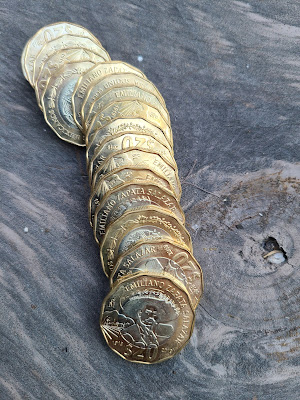Everything turns out well in the end.
Or, at least, it turns out.
That has proven to be true of the Bank of Mexico's announcement that the 20-peso note would be withdrawn and replaced by an expanded supply of 20-peso coins. That announcement was four years ago (bienvenidos, benito -- y adiós). What has happened since?
Not much. The workhouse blue note featuring Benito Juarez face is still circulating, but very few 20-peso coins are. That has been my experience in our little backwater on the coast. I have received only one 20-peso coin in change.
This week I withdrew some pesos from my main bank. The bank seldom has any change. My wallet was filled with 500-peso notes that are not extremely easy to use at most businesses. The gas station. Hawaii (my preferred grocery store). A couple of high-end restaurants. Tour companies. That just about exhausts the list of places where a 500-peso note can be presented without feeling a bit ashamed that you are exhausting the resources of the business.
To avoid the awkwardness, I usually take my big bills to Banamex and change them into denominations that are a bit less-economically heretical. When my number finally popped up on the you-are-next screen, I asked the teller for a mix of notes. Twenties. Fifties. Hundreds. Two hundreds.
She started counting out the latter three in neat little piles. She then told me something I have been waiting to hear for four years. The bank did not have any 20-peso notes. Would I like coins, instead?
Because I like anything new, I took her up on her offer. Otherwise, I would not have had any 20s. The denomination is handy here -- even with Mexico's current inflation resulting in higher consumer price.
What I received is what you now see. I almost feel like a pirate having liberated Spanish doubloons from the Manila Galleon. Except the portrait is not of Carlos II, but a hero of the Mexican revolution -- Emiliano Zapata.
When I originally wrote about the note withdrawal, a Canadian acquaintance and an English friend shared their personal woes with the withdrawal of the 1- and 2-dollar notes, and the switch from paper to metal of the 1-pound note. Both bewailed the weight of the "shrapnel" in their pockets.
We Americans have had a couple of brief encounters with governments attempting to enforce a metal dollar on the public. The Eisenhower dollar in the early 70s. The Susan B. Anthony dollar in the late 70s. The Sacagawea and presidential dollars in the early 2000s.
None of them caught on with the public -- even when vending machines started dispensing them as change. They were either too large or too heavy. That is why Americans elected to stuff their wallets with one-dollar notes.
Of course, notes are becoming a vestige of the past almost everywhere in the world. Most commercial transactions are now conducted electronically. When I go north, I never use cash. I either use my credit card or the credit function on my FitBit. Before long, I will even forget which president (or other worthy) is on which note.
Even though credit card usage is far more common in the little villages where I have immigrated, most small business do not offer that option. This is a cash economy.
I suspect I will be memorizing the faces on the Mexican notes for some time. And Mexico will continue to do its part by printing a new series every five years or so. Or minting coins of ever-larger denominations.
As the old saying goes, it all spends the same.



_svg.png)
_svg.png)
_svg.png)

















